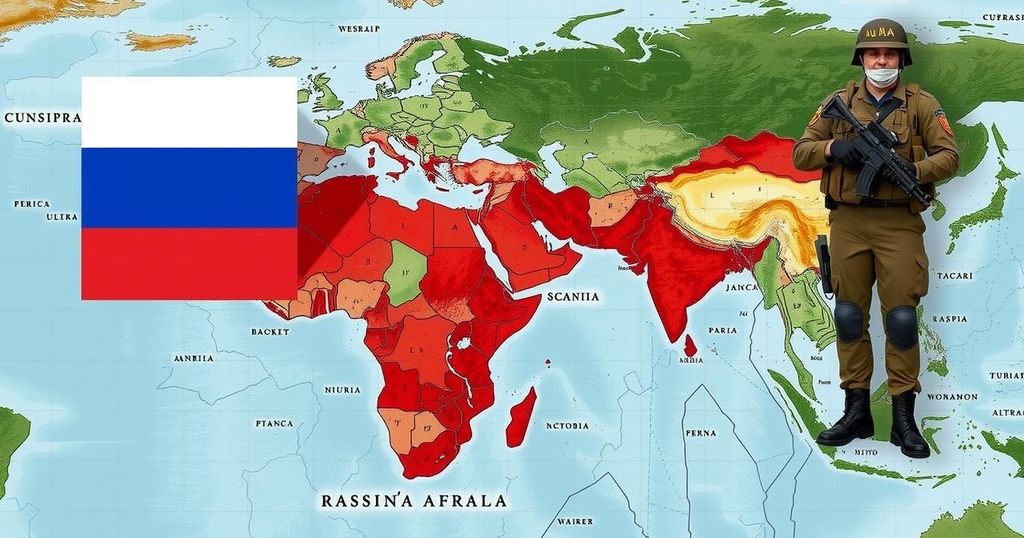The Diminished Authority of Russia in Africa Due to Syrian Setbacks

The recent loss of influence in Syria has severely compromised Russia’s ability to project power in Africa. As Russian forces withdraw from strategic bases, fears of diminished support among African allies grow. The logistical strain of supplying military operations without a Syrian foothold complicates Moscow’s security partnerships. Russia’s military interventions, previously framed as successes, now appear ineffective, prompting a reassessment of its engagement strategy in Africa.
The recent upheaval in Syria has severely undermined Russia’s image as a global power, impacting its influence across various regions, including Africa. The overthrow of President Bashar al-Assad coincided with significant military shortcomings for Russia, stemming from missteps in Ukraine and inability to fortify its ally during rapid offensives by opposition forces. Consequently, Russia’s military presence in Syria has significantly dwindled, fueled by substantial withdrawals from vital bases such as Tartus and Khmeimim, leading to deep concerns regarding its strategic operational capacity in Africa.
As the Kremlin reassesses its operations, the logistical challenges associated with sustaining an African presence without the benefits of a robust Syrian foothold become apparent. Russia’s military engagement in Africa has heavily relied on supply routes and operational bases in Syria, which acted as a crucial hub for dispatching resources to supporting regimes like that of Libya’s Khalifa Haftar. Following the setback in Syria, Moscow’s influence over African autocracies is now in question, with leaders reconsidering their reliance on Russian security support amidst these consequential changes.
The operational synergy between Russian initiatives in Syria and Africa underscores the strategic importance of maintaining a strong military foothold in the former. The completion of military transitions of resources, such as the provision of munitions to various factions in conflict zones, is now at risk due to operational disruptions following recent losses. Russia’s faltering military posture raises doubts among African states about its ability to fulfill security commitments, which could disrupt the perception of Moscow as a resilient ally.
Despite these challenges, the Kremlin has signaled a desire to maintain collaboration with Syrian authorities, including potential negotiations with jihadists for base access. This may alleviate some logistical challenges but may also involve accepting terms that could further tarnish Russia’s image. The prospect of alternative bases in Libya or Sudan has been discussed, though both locations present substantial hurdles that could impede the logistical and operational dynamics critical to Russia’s military strategy in Africa.
The current geopolitical landscape indicates that Russia’s aspirations for a pervasive security role in Africa are now compromised. Political realities dictate that without a revitalized and stable operation in the Middle East, Moscow risks losing its foothold not only in the realm of international influence but also in its scarcity of economic resources like gold and diamond reserves, which are vital to sustain its war efforts. These developments compel Russia to explore avenues for rejuvenated partnerships and reassess its engagement tactics towards a more diplomacy-driven strategy in Africa.
The intertwining of Russia’s military operations in Syria with its strategic interests in Africa underscores a complex geopolitical relationship. Beginning with Russia’s intervention in the Syrian Civil War in 2015, Moscow established military facilities to support the Assad regime, which has later proven essential in facilitating resources that extend to Africa. Over the years, Russia has leveraged these connections to fortify relations with various African leaders, creating a perception of reliability and strategic partnership. Recent developments, however, reveal that the loss of its Syrian stronghold has sparked doubts regarding Russia’s capability to maintain its influence across the African continent and counter the adverse impacts of its military failures and withdrawal from key operational bases.
In summary, the downfall of Russian influence in Syria not only weakens Moscow’s military capabilities but also signals an existential crisis for its standing in Africa. With logistical support severely compromised and reliance on Syria for operational purposes diminished, Russian leadership faces a pivotal transition in its foreign strategy. The intertwining of its geopolitical aspirations with historical military engagements demands a recalibration of how Russia interacts with African states, leading to a potential shift away from aggressive military interventions towards more nuanced diplomatic relationships. The coming months will be critical in shaping whether Russia can retain its standing within Africa amidst these challenges.
Original Source: foreignpolicy.com








